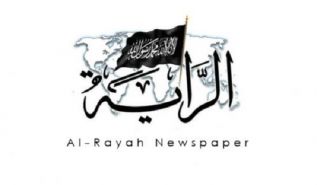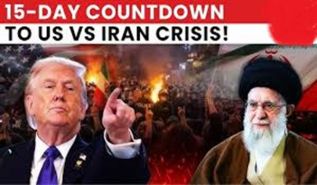بسم الله الرحمن الرحيم
Tariffs as a Strategic Pressure Tool: The Cold Front between the US and China and the BRICS Challenge
(Translated)
Al-Rayah Newspaper - Issue 557 - 23/07/2025 CE
By Dr. Muhammad Jilani
Ten countries within the BRICS group - Brazil, Russia, India, China, South Africa, Egypt, Ethiopia, Iran, Indonesia, Saudi Arabia, and the UAE - met in Rio de Janeiro, the capital of Brazil, on Saturday, July 6, 2025. During the meeting, they signed a document titled “Strengthening Global South Cooperation for a More Inclusive and a Sustainable Governance,” which affirms the group’s commitment to promoting multilateralism, defending international law, and striving for a more just global order.
No decisions or initiatives were taken during this meeting regarding the issuance of a new monetary system, or any of the major international or regional issues, such as the war in the Ukraine or the Middle East. However, the BRICS group used the summit’s joint declaration to criticize the upcoming tariffs to be imposed by the United States.
In response, US President Trump stated that America would impose an additional 10% tariff on any country that joins the “anti-American policies” pursued by the BRICS group.
Trump’s threat to impose additional tariffs underscores a broader US strategy, that increasingly merges economic policy with geopolitical objectives. While US tariffs, especially those targeting China, were initially designed as corrective measures to address trade imbalances, they have evolved into a central tool of strategic confrontation, shaping global alliances and redrawing economic boundaries.
During his first term, Trump launched a fierce trade war against China, imposing tariffs on Chinese goods worth over $360 billion. While the official justification was to counter unfair trade practices and intellectual property theft, strategic documents and think tank analyses point to a deeper motive: to curb China’s rise as a formidable technological and military power. As stated in the Heritage Foundation’s 2022 report, “Winning the New Cold War: A Plan for Countering China,” this approach, described as a “geo-economic policy,” employs tools such as tariffs, sanctions, and export controls to assert US dominance in both the economic and security arenas.
This strategy has continued under the Biden administration, as evidenced by export restrictions targeting China’s semiconductor and artificial intelligence industries, along with the CHIPS and Science Act. These measures indicate a bipartisan consensus that economic ties with Beijing pose risks to US national security. The Carnegie Endowment for International Peace has affirmed that trade and investment are inseparable from strategic interests and competition.
The South China Sea and the Indo-Pacific region have become key theaters for implementing this strategy. Tariffs have coincided with increased military deployments, freedom of navigation operations, and the formation of alliances such as AUKUS (Australia, the US, and the UK) and the Quad (Australia, the US, India, and Japan) all aimed at containing China’s maritime influence and regional power. According to Politico 2024, the economic pressure campaigns during Trump’s presidency were closely aligned with Pentagon objectives, both during his term, and under Biden’s administration, before and after.
For its part, China has repeatedly rejected these Cold War-style containment efforts, reminiscent of the past rivalry between the US and the Soviet Union. President Xi Jinping has criticized “unilateral tariffs and trade wars” as destabilizing to the global order, calling instead for a return to “genuine multilateralism” and “win-win cooperation.”
In a paper outlining China’s national security strategy, the Chinese government explicitly condemned “bloc politics.” China’s Foreign Ministry denounced Trump’s 2025 warning, describing it as “economic coercion” aimed at dividing the world into opposing camps. As stated by China’s Foreign Minister in response to Trump’s tariff hike announcement: “Tariffs should not be used as tools of coercion, intimidation, or interference in other countries” (Time, 2025).
Now, Trump’s latest warning signals a new phase in this strategic rivalry. By threatening to punish countries that deepen economic ties with the BRICS bloc, which includes Brazil, Russia, India, China, and South Africa, the United States is effectively drawing lines of allegiance in an emerging multipolar world. His administration has described BRICS as a platform that enables anti-American policies, particularly through efforts to de-dollarize, nationalize resources, and offer multilateral lending alternatives to the International Monetary Fund. (Financial Times, 2025).
Thus, economic retaliation is no longer merely about bilateral imbalances it has become a tool for global alignment, used to discourage the formation of independent blocs and to reinforce trade and security structures centered around the United States, according to reports by the Brookings Institution. These tariff threats are part of a broader campaign to reshape the global order in line with American norms, supply chains, and capital dominance.
These threats carry profound implications. With Brazilian President, Lula da Silva, rejecting Trump’s warning as “wrong and irresponsible,” and other BRICS members reaffirming their commitment to “reforming global governance,” the risk of a fragmented global economy becomes increasingly apparent. Such divisions could lead to the emergence of parallel financial systems, competing digital infrastructures, and ideologically split trade blocs paving the way for what many are now calling a “Second Cold War,” not fought through proxy wars, but through tariffs, tech restrictions, and the reorganization of supply chains.
Given the current international political reality entirely rooted in a single ideological foundation of idealistic capitalism, there appears to be no real prospect for radical change. Today’s global order is being reshaped based on the interests of major powers, far removed from the principles of justice, balance, and human dignity.
This is why the world is in urgent need of a new ideological foundation, one that redefines concepts of governance and the fair distribution of wealth, both within nations and on a global scale. Islam, as an ideology, with its well-documented historical record of justice and its deeply rooted intellectual foundation in the sovereignty and legislation of the Creator, is capable of fulfilling this role. It offers an ideological model that balances rights and responsibilities, placing human welfare and justice at the heart of the political and economic system.
[لَقَدْ أَرْسَلْنَا رُسُلَنَا بِالْبَيِّنَاتِ وَأَنزَلْنَا مَعَهُمُ الْكِتَابَ وَالْمِيزَانَ لِيَقُومَ النَّاسُ بِالْقِسْطِ وَأَنزَلْنَا الْحَدِيدَ فِيهِ بَأْسٌ شَدِيدٌ وَمَنَافِعُ لِلنَّاسِ وَلِيَعْلَمَ اللهُ مَن يَنصُرُهُ وَرُسُلَهُ بِالْغَيْبِ إِنَّ اللهَ قَوِيٌّ عَزِيزٌ]
“We have already sent Our messengers with clear evidences and sent down with them the Scripture and the balance that the people may maintain their affairs in justice. And We sent down iron, wherein is great military might and benefits for the people, and so that Allah may make evident those who support Him and His messengers unseen. Indeed, Allah is Powerful and Exalted in Might.” [TMQ Surah Al-Hadid: 25]




